Learn about resources for automobile drivers to produce flexible income using the latest apps for Android, iOS, & Windows smartphones. Email Address
Don't wanna be here? Send us removal request.
Text
Top 5 Audi R8 Carbon Fiber Collection Accessories

5. Audi R8 2007-2015 Carbon Fiber Winglets (2PC)

/**/ Audi R8 Carbon Fiber Winglets /Canards. These canards do not require you, to cut slots or drill holes in your front bumper , like the factory canards do. They are attached with special 3m double sided tape with adhesive promoter, and have been tested at very high speeds not to come off. FITS COUPE AND SPYDER CARS ALL YEARS AND V8 & V10 MODELS
4. Audi R8 2007-2015 Carbon Fiber V10 Style Side Skirts (2PC)

/**/ These V10 style carbon fiber side skirts fit 2007-2015 V10 & V8 R8 are made of the highest quality to fit this high-end vehicle and are a direct replacement for the OEM side skirts and use the same installation points. They are vacuum formed and not hand laid for the Audi R8 V8 model and are reproduced to fit like the original part with the 2x2 perfect no flaw carbon fiber weave finish. This product will give your Audi V10 & V8 R8 the carbon look.
3. Audi R8 2016-2018 Carbon Fiber Front Splitter (1PC)

/**/ 2016, 2017, 2018 Audi R8 Carbon Fiber Factory Front Splitter Fits Coupe & Spyder V8 & V10 models. This factory carbon fiber car accesories exterior body part front splitter is made of the best & highest quality, to fit this high-end vehicle and are a direct replacement for the OEM front splitter and use the same installation points.
2. Audi R8 2007-2015 Carbon Fiber Rear Wind Deflector (1PC)

/**/ 2007, 2008, 2009, 2010, 2011, 2012, 2013, 2014, 2015 Audi R8 Carbon Fiber Wind Deflector car accessories auto parts body style kit. Audi R8 Carbon Fiber Rear Wing Deflector fit 2007-2015 V8 & V10 R8 are made of the highest quality to fit this high-end vehicle and are a direct replacement for the OEM wing deflector and use the same installation points. This product will give your Audi V8 & V10 R8 the carbon look.
1. Audi R8 2007-2015 Carbon Fiber V10 Style Side Panel Blades (2PC)

/**/ 2007, 2008, 2009, 2010, 2011, 2012, 2013, 2014, 2015 Audi R8 Coupe V8 & V10 Carbon Fiber V10 Style Blades (2pc). These car accessories exterior bodykit V10 style carbon fiber side blades are made of the best highest quality to fit this high-end R8 vehicle and are a direct replacement for the OEM side blades and use the same installation points. FITS COUPE 2007-15 YEARS AND V8 & V10 MODELS to see our full Audi R8 carbon fiber collection visit our store https://shop.autobunch.com today! Read the full article
0 notes
Text
Trade War Watch: Trump Launches National Security Investigation On Auto Imports


President Donald Trump issued a tweet promising car manufacturers good tidings on Wednesday. “There will be big news coming soon for our great American Autoworkers,” he said. “After many decades of losing your jobs to other countries, you have waited long enough!” Later that same day, the administration announced it had launched a national security investigation into car and truck imports under Section 232 of the Trade Expansion Act of 1962. The Commerce Department explained that the probe would investigate whether imported vehicles and parts threaten the domestic industry’s wellbeing, taking into account its ability to develop new technologies and the impact of tariffs. “There is evidence suggesting that, for decades, imports from abroad have eroded our domestic auto industry,” Commerce Secretary Wilbur Ross said. While Ross assures a “thorough, fair and transparent investigation,” opposition to the probe has already begun to emerge. “China opposes the abuse of national security clauses, which will seriously damage multilateral trade systems and disrupt normal international trade order,” Gao Feng, spokesman for the Chinese Ministry of Commerce, said at a news briefing on Thursday. China recently agreed to cut its tariffs on imported automobiles in a bid to open its market to foreign automakers. This occurred after the U.S. announced new import taxes on steel and aluminum. Meanwhile, America recently worked out a deal with South Korea that involved a tentative promise to open its own market a bit if the western nation agreed to give it a break on steel tariffs. No such deal exists with Japan. Curious, since it’s one of the United States’ closest security allies and imposes no tariffs on vehicles. According to Reuters, Germany’s DIHK Chambers of Industries and Commerce said Trump completely ignored the fact that German companies invest heavily in the U.S. and create manufacturing jobs there — a claim that could be similarly made for Japan and South Korea. “To cite aspects of national security as justification is totally constructed and far-fetched. We almost have to take this as a provocation,” DIHK President Eric Schweitzer said. “I gain more and more the impression that the United States no longer believes in competition for ideas and customers, but only in the right of the supposedly stronger.” “It fills me with great concern that the U.S. is moving away from a free and fair world trade order,” he added. The Commerce Department’s claim that the probe is intended to determine if lost domestic production has affected the U.S. economy seems clear cut enough, but analyzing if automakers lost the ability to research advanced technologies is somewhat perplexing. While the United States isn’t the global leader in every category that qualifies as advanced tech, it’s the way in the field of autonomous driving and remains competitive just about everywhere else as far as development is concerned. A Trump administration official said prior to the probe’s announcement that the expected strategy would be involve pressuring Canada and Mexico to make concessions on NAFTA. Considering how poorly and slowly those talks have progressed, threatening research that could result in higher import fees could be a way to convince them to play ball. The investigation could have a similar goal in regard to other countries that ship a lot of cars to the United States, too. In a meeting with automakers earlier this month, Trump speculated that tariffs on imported automobiles and parts may be increased. Sources claimed the president said 20 percent or 25 percent on some vehicles, which would represent a massive increase. While trucks have been subject to U.S. import duties of 25 percent for decades, imported cars sit at a only 2.5 percent. For the sake of comparison, Europe imposes a relatively flat 10 percent import tariff on vehicles. China has said it will reduce its 25 percent fee on automobiles to 15 percent starting this July. However, trucks are expected to stay at 20 percent. Read the full article
0 notes
Text
‘They Will Grow Older’: Jaguar’s Product Boss Is Damn Sure Millennials Will Eventually Choose Self-Indulgence


Teen car culture is dying a swift death, The Atlantic claims, but Jaguar Land Rover’s head of product strategy feels the youngsters of today will eventually outgrow their desire for hassle-free autonomous commute pods. As a great Jaguar print ad in the 1990s once stated, “Live Vicariously Through Yourself.” In Hanno Kirner’s mind, this mantra will guide more than a few Millennials to take over the driving duties and indulge their innermost desires. It had better. Kirner made the comments during an interview with Britain’s Autocar, in which he tiptoed around the possibility of a high-performance, stupidly fast SVR version of the I-Pace electric SUV. “Yes, we can make it do 0-60 mph in 1.8sec,” he said on that topic. “It’s a good headline, but once you’ve done it once or twice, and lost your eyes in the back of their sockets, you might not want to do it again.â€� To Jag’s product chief, the onset of autonomous driving will only spur the production of go-fast machines. While self-driving cars, either leased or owned or shared, will tackle the day-to-day drudgery of commuting and errands, automakers will unleash specialty human-driven automobiles to fill the enthusiast void. “Whether it is recreating classics to modern standards or creating track-day specials, I think it will grow as autonomous driving becomes a regular part of lives,” he said. “I don’t for one second think we’ll see a generation appear with no interest in cars. Driving enthusiasts will still exist and we’ll want to engineer cars for them.” This jibes with Porsche’s recent promise to manufacture vehicles with steering wheels for as long as it’s legal. To a lesser degree, Rolls-Royce recently claimed it won’t abandon V12 engines until the government forces its hand. With age comes a growing desire to use one’s earnings to cut loose and have a little frivolous fun, Kirner implies. There’s also the go-anywhere/do-anything element. “Today, we have more demand than we can satisfy for such cars and I don’t expect that to change,” he said. “Yes, there is a generation that is more interested in their phones than anything else today, but they will grow older and want to drive one day.” Read the full article
0 notes
Text
2018 GMC Sierra Denali 1500 First Drive – Trucking Around Out West
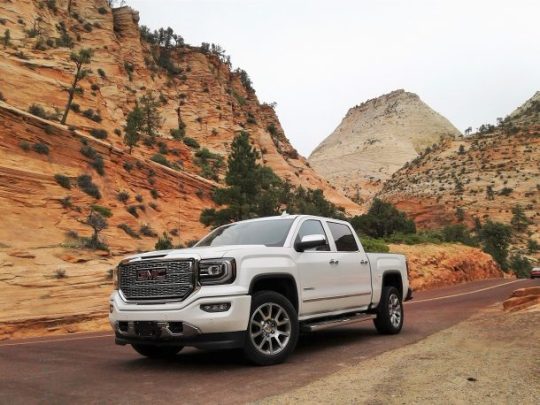
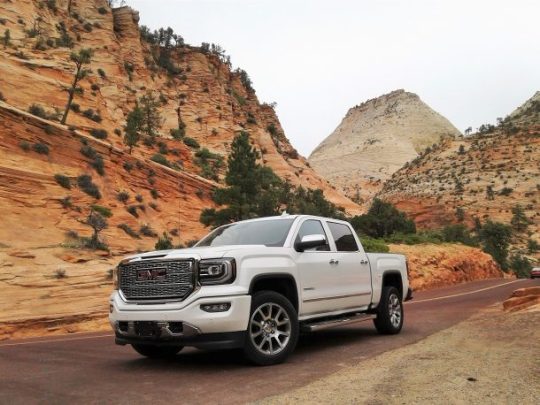
TTAC recently spent some time out in rural Utah, where GMC was keen to show off the 2018 Sierra Denali’s capabilities in both towing and everyday driving. Does the soon-to-be-replaced luxury pickup have what it takes to get the job done? That depends on the options boxes, and which ones have been checked. (Full disclosure: GMC flew me to St. George, Utah and paid for hotel accommodation and meals. They also provided ATVs for riding in the sand dunes, and paid for entry into Zion National Park. I was also offered a Nike GMC baseball cap which I didn’t take, and some off-roading goggles which I did.) Ace of Base Perhaps surprisingly, GMC’s lineup of Denali testers were not all loaded to the max. In fact, only two of the six test vehicles had the big 6.2-liter V8 in them, while the rest made do with the base 5.3-liter engine. I know how the BB just hates when testing is of the high-zoot nature, so it was just fine when I was assigned the 5.3-equipped White Frost Tricoat Denali. No huge wheels, no Ultimate Package, no rear entertainment, no automatic step. Matthew Guy would be most pleased. The four-wheel drive tester’s only options were the metallic white paint ($995), sunroof ($995), and the trailer controller ($275). The destination charge of $1,295 brought this vehicle’s total price to $59,560. Let’s get going. Towing
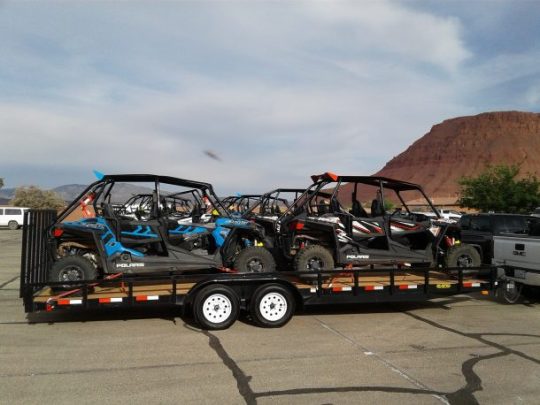
GMC says 70 percent of Sierra 1500 owners tow with their truck, and 40 percent of them do it more than once a month. The automaker loaded up two Polaris RZR side-by-sides on the back of each truck, explained how to tow things without crashing, and sent us on our way to the Coral Pink Sand Dunes State Park.
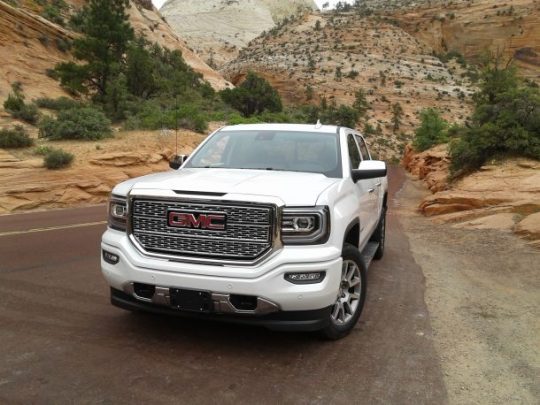
On the road with between 5,000 and 6,000 pounds on the back, all testers were well within the Denali’s 9,100-pound tow rating. Though the trailer controller option was present, our trailer did not have brakes. Slowing for stops in a controlled and constant way wasn’t a problem, but having that sort of length behind the truck takes some getting used to (first-time tower, here). The 5.3-liter engine has been in the GMTs for generations now, and in present state has 355 horsepower and 383 lb-ft of torque, sent to an eight-speed automatic. For lower speeds around town, the additional weight behind didn’t pose a problem. But on any incline or highway situation, I found myself wishing for more power. A foot hard down was required on an entrance ramp with a moderate incline. In that moment, the thought of having the 6.2 in front of me was most appealing. Once up to speed, the rig felt stable and confident between the painted lines, even if the driver wasn’t. Lane keep assist will nudge the wheel in the correct direction if you go astray, but it’s not too invasive and can be switched off via a switch on the dash.
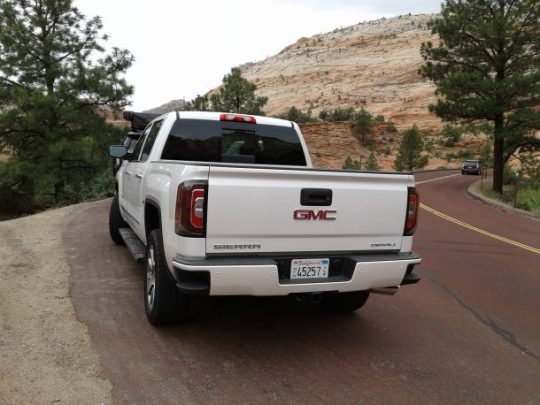
We made it to the dunes without incident, but I can’t see any serious towing owner selecting the 5.3 for regular hauling. Spend the ~$2,000 for the 6.2 and enjoy your Towing Stuff Lifestyle and a higher resale value down the road. Looking Around
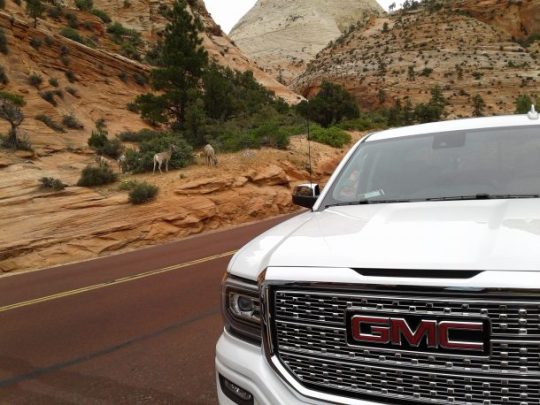
The blocky, masculine looks of the Sierra Denali is a familiar sight on roads by now, and that hasn’t changed for the 2018 model year. New paint colors (silver and red) coat the squared-off fenders and straight lines. The pearled white paint made for a clean look (it’s the most expensive paint color), and is a shade GM has done well with across brands. Paint finish seemed good, with little to no visible orange peel.
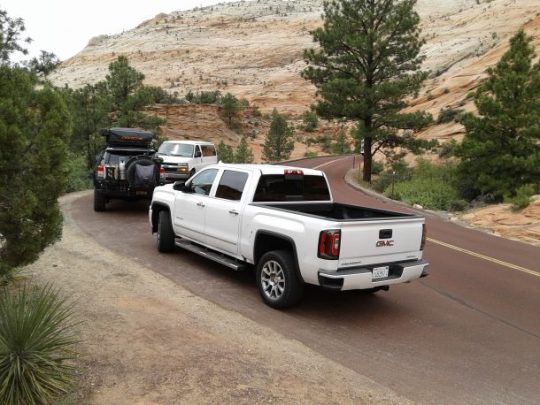
HiD lamps light the way up front, and Altezza-style LED lights accompany the rear. Dropping the dampened tailgate to the short box reveals the standard spray-in bed liner. Our tester had polished 20-inch wheels, since those are the ones that don’t cost extra. The door handles feel solid, and pull with a reassuring action. Shutting the door from either side of it produces a nice, low thud. And now we’re indoors. Inside
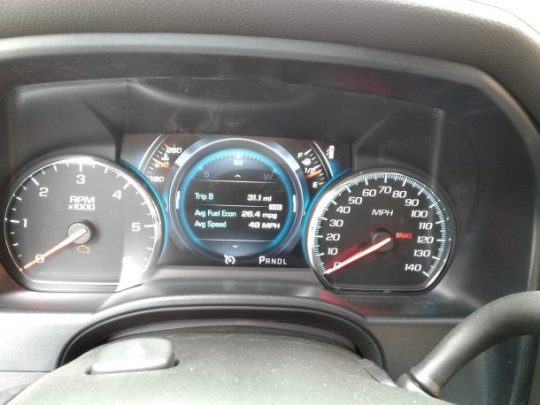
The tester was equipped with the black leather interior option, though light brown “cocoa” leather is also available at no extra charge (would’ve been nice). Analog speedo and rev counters flank the instrument cluster’s center screen to display all the necessary information, which gets slightly reconfigured in tow mode to include a transmission temp gauge. I never wanted for more information in the Denali. On the tech front, navigation is standard and so are Android Auto and Apple CarPlay. There are also outlets of USB and regular variety, as well as wireless charging in the center console.
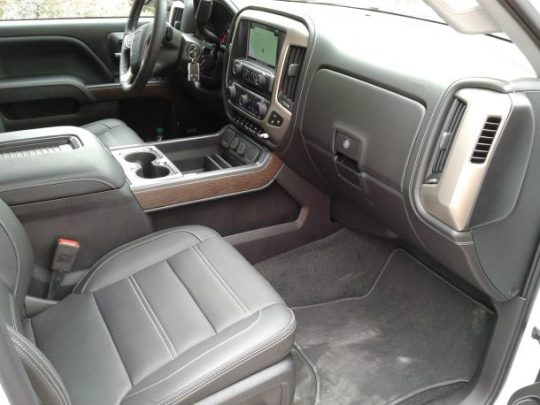
Buttons are where you’d expect, apart from the pedal adjustment in the center stack. It used to be on the door with the seat memory controls, which seems a more appropriate place. Everything you need is within reach and labeled in an understandable way. I found the seats comfortable and supportive, and both driver and passenger have many adjustments. Heat and ventilation arrive under your backside, though I wished for stronger ventilation. It wasn’t that hot, and not that sunny, and still the seat just felt room temperature — never cool.
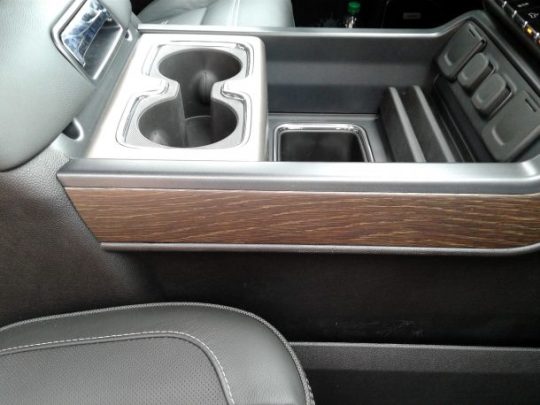
Materials in the cabin are varied and don’t all seem cut to the same standard. The leather on the seats is soft and perforated, and the thickly padded dash has a stitched leather appearance. But the graphite-color trim around the vents is hard plastic, and the soft touch door panels at the front don’t extend to the rear — hard plastic back there.
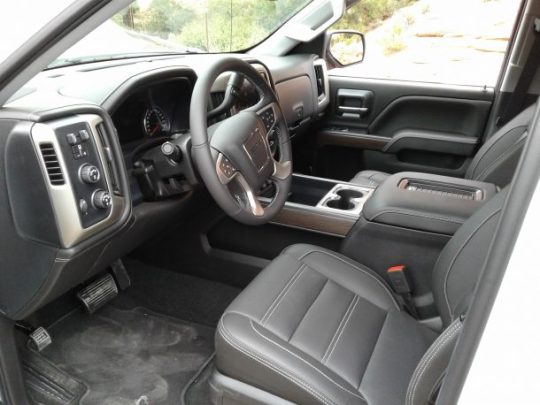
Though my elbow rested on a nicely padded rest in the door, when my hand grabbed for the interior handle it found two roughly cut pieces of plastic, a seam against the back of my fingers. Some similar roughness was on the edge of the door and cargo pocket areas. There is wood trim along the console, but it’s quite artificial, and a bit too glossy. I expect real wood in this class, or at least some faux-matte open pore look stuff. Time to retreat to the back seats.

Leg room back there is much better than older GMT generations, and I had several knee inches to spare with my 6 foot and 32″ inseam measurements. The rear seats are a bit too flat, too upright, and do not recline at all. Thigh support is on the short side, and after a couple of hours back there it got a bit uncomfortable. And hot, because there are no rear air vents. I sat and stared at the blank rear of the center console, where there were no vents, temperature controls, or heated seat buttons — all things I expected on a $60,000 truck. I did use the fold-out center armrest, which was located a bit too high. It also had two cup holders in it, which meant there was little padded room for any limbs to rest. Not Towing
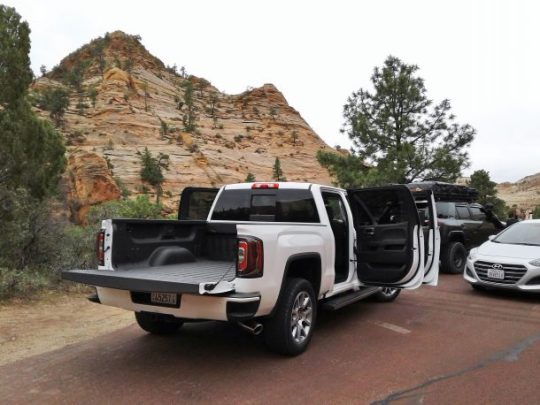
Before sitting in the back, I spent a few hours driving up front, and this time there wasn’t a trailer. The 5.3-liter that’s been at GM for so long has been refined and honed over the generations, and its present NVH is laudable. Idling, it’s a whisper, and nothing is felt through the cabin. Once let loose from its trailer duties, the 5.3 Denali behaved in a much more appealing way. Acceleration was just fine if you pressed the pedal a bit, accompanied by a quiet engine grumble. Shifts from the 8AT were smooth, though I did notice a tendency to upshift a bit sooner than I’d prefer in highway circumstances, especially at slight grades. Unless the paddles are used (they’re there), it forces a stab of the throttle to initiate a kick-down of a couple of gears.
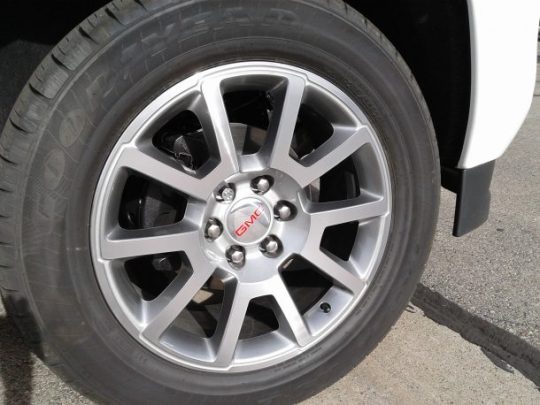
All Sierra Denalis come with GM’s Magnetic Ride Control suspension as standard, and it works. The ride felt controlled through twisty and sometimes narrow roads within Zion National Park, and the truck didn’t bound or ride harshly over the occasional cattle grates. Some of this should be credited to the taller sidewall present on the 20-inch wheels, as those chrome 22-inchers are going to punish when the going gets rough. At speed, wind and tire noise was minimal. Anyone who’s been in a truck of even 10 years ago would notice a marked difference in the amount of isolation here. Steering on the leather-stitched wheel was fairly light, and it was easy to place the truck where desired. As expected in this class, feedback from the wheel is suitably minimal.
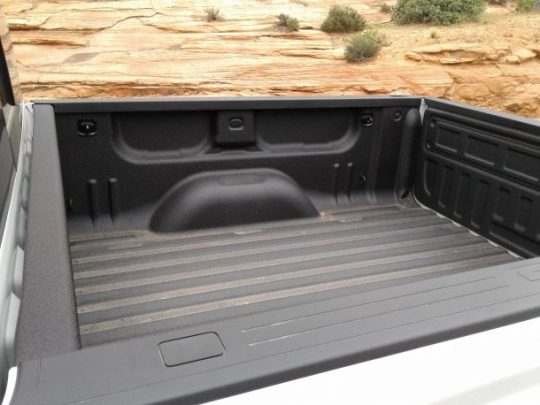
Another unobtrusive feature was the cylinder deactivation. Under light loads and on flat grades, the 5.3 will switch off half the engine block and run as a V4. The only way this was perceptible was when the green “V4” logo came up on the dash. In fact, the engine had been running in 4-mode for probably two minutes before I noticed — completely seamless. And the deactivation needed to be there, because the trip computer reported that after 155 miles of mixed and fairly gentle driving (at an average speed of 37 miles per hour) fuel economy stood at 15 mpg. That’s at the low end of the EPA estimate of 15 city, 20 highway, and 17 combined. Overall, there’s a case to be made for this Ace of Base Sierra Denali. Said case makes sense for someone who doesn’t tow regularly, likes the present Denali styling and standard features, and doesn’t see the need for the 6.2-liter engine or the whiz-bang features of the $6,775 Ultimate Package. It’s a comfort and luxury truck for the seldom-towed path.

Bonus picture of these bighorn sheep, six of which walked right up behind me as I was taking pictures of the Sierra. Read the full article
0 notes
Text
2019 BMW M5 Competition: A More Menacing M


As domestic automakers usher sedans onto the precipice of a mass grave, it appears German manufacturers have yet to give up on them — at least the fancier ones. BMW recently announced the M5 Competition, which is an amped-up version of the standard performance model. Somehow, we get the feeling the Competition exists only so BMW can set a better lap time at the Nürburgring. Excluding its visual enhancements, we doubt many drivers would be able to notice any changes from the already fast M5. Adding 17 additional horses to a lightweight hatchback is transformative, but the same cannot be said for a 600 hp sedan weighing in at over two tons. But that’s what the Competition offers — along with revamped suspension tuning, more aggressive looks, and an angrier sound. None of that is bad, however. Shaving off a tenth of a second to 60 mph (and three-tenths to 124 mph) still represents an overall improvement, whether it’s discernible when entering the highway or not. We’re just not positive it’s worth the money if you’re not in the habit of taking your M5 to track days.

Torque remains unchanged from the standard model. The M5 Competition’s turbocharged 4.4-liter V8 still makes 553 lb-ft of torque. But it is on a slightly wider band, with the pull coming in between 1,800 and 5,860 rpm. Riding seven millimeters closer to the ground vs the normal M5, BMW has also implemented tweaks to the Competition’s springs and dampers. It won’t be bone shattering on a bumpy road, but expect a firmer ride overall. Increased negative camber on the front axle should give the tires better purchase in the turns, as well. Top speed is a sufficient-for-most 155 mph. Those unsatisfied can option in the M Driver’s Package, making the model capable of 189 mph. In addition to removing the speed governor, BMW is offering a driver’s training course for customers who purchase the package.

Without it, the 2019 BMW M5 Competition costs $110,995, including a $995 destination fee. That’s $7,400 more than the standard M5 sedan. However, you do get Y-spoke alloy wheels and gloss-black accents all over the exterior, along with an active M Sport exhaust with similarly dark finishers. Interior changes are more subtle and include unique seat belts, floor mats, and instrument cluster graphics. The important thing is that the car looks and sounds more menacing. For many, that will be enough to rationalize the price. Production of the 2019 BMW M5 Competition is slated to begin in July.



Read the full article
0 notes
Text
Incredibly Small Car Brand Loses Its Head


People make fun of automakers with severely limited vehicle lineups, but Mitsubishi has nothing on the diminutive — in every sense of the word — Smart brand. Note: we’re using a capital “S” here and always will. Technically, the Daimler AG division sells a single model in the United States, though the powers that be break it up into two: coupe and cabriolet. Well known for being the smallest, lightest mass-produced new car on the domestic market, the Fortwo quickly gained a reputation for having the jerkiest, most unsatisfying transmission in existence. Recently, engine fires sparked (pardon the pun) a recall of 43,000 2008-2009 vehicles in the U.S. and 7,000 in Canada. Born as a diesel-powered division before changing over to gasoline propulsion, Smart has now evolved into an electric-only brand. And its U.S. sales have never been lower. Maybe the new head of Smart will have some ideas. Announced Tuesday, CEO Dr. Annette Winkler will step down from the division’s helm after eight years, effective September 30th. Winkler has been with Daimler for 23 years. “One of the key responsibilities of every executive is to pass on leading positions to the next generation at the right time,” Winkler said in a statement. “And that time has now come – with the clear focus of smart as a fully electric urban-mobility brand and with the decision to develop the Hambach facility into a plant for fully electric vehicles within the Mercedes-Benz production network. With my endless passion for smart and the people behind it, this decision was not easy for me. I am all the more pleased that I can now support the handover to a successor.” Currently, the identity of Winkler’s replacement remains a mystery, much like the brand’s future. Dr. Dieter Zetsche, Daimler chairman and Mercedes-Benz boss, said “the smart plant in Hambach has continually improved its competitiveness and is extremely well positioned for the future” thanks to Winkler’s efforts. The company recently announced plans to produce a small, EQ-badged Mercedes-Benz vehicle at Hambach.

Now that Smart is an entirely electric entity, at least in North America, Daimler saw fit to bestow its “EQ” label on the brand and its vehicles. For the 2018.5 model year, the division becomes “Smart EQ,” with its sole U.S. vehicle sold as the Smart EQ Fortwo Electric Drive. The model draws 80 horsepower and 118 lb-ft of torque from its electric motor, making it the fastest Fortwo to date. A price cut accompanied the brand’s green evolution. Sadly, the electric model’s 2017 update saw range fall from an already paltry 68 miles to an even worse 58 miles, making this “city car” an urban denizen purely out of necessity. In the U.S. in April, just 93 customers picked up a Fortwo Electric Drive. 33 Canadians did the same. This is quite a fall for the Fortwo, which, in its first year on the U.S. market (2008), sold 24,622 examples. Last year’s tally amounted to 3,071 vehicles, and the first four months of 2018 show a 70.8 percent volume loss. A rare car, indeed. Not unsurprisingly, there’s even a cheaper lease on leftover 2017 models advertised on Smart’s U.S. consumer website. In the division’s home market, customers get a choice between two- and four-seater models, and cars can still be ordered with internal combustion engines (Smart goes all-electric there in 2020). Given the wide differences between North America and the continent, it’s not a shock to see Smart’s European sales topped 100,000 units in the past two calendar years. This side of the Atlantic, however, it’s a hen’s tooth. Read the full article
0 notes
Text
Audi Announces A8 Pricing, but Model Lacks Tech Promised for U.S.


Audi recently announced pricing for the V6-equipped A8, arriving in dealerships this fall for the rock-bottom price of $83,800. Alright, so that’s not exactly chump change, but Audi promised tech that would embarrass practically everything else on the road — including the Mercedes-Benz S-Class. In some markets, it seems as if the brand will deliver on those promises. The sedan is practically dripping with technology, including the impressive-sounding Traffic Jam Pilot. The system offers a claimed hands-free experience at speeds below 37 mph, as the vehicle can crawl in heavy traffic without the need of a driver. You’ll still need to turn it off and take over in urban environments but, so long as it’s a relatively straight shot, the car will do all the work. Unfortunately, Audi seemed to have axed its availability for the United States. Audi claims America’s legal system, mixed-bag roadway infrastructure, and recent consumer issues has forced it to stall the technology. That doesn’t mean it won’t eventually get here, but it definitely won’t arrive when the A8 shows up in the autumn.

When Traffic Jam Pilot was announced, the automaker recommended only using the feature on straight roads where a “physical barrier separates the two carriageways.” How relevant the suggestion is in regard to Audi’s decision, is debatable. It’s not as every roadway in Europe is separated by a center median. Our guess is that the growing safety concerns surrounding autonomous cars is the primary culprit here — with a dash of legal fears. Despite the federal government green lighting unproven technology from auto manufacturers and tech firms that would never in a million years be okay to test out on your garage build, there’s been moderate backlash against self-driving hardware following a string of high-profile accidents. However, the 2019 A8 will still come with the sort of tech that may have contributed to those incidents. Instead of the hands-off Level 3 system, the car will be available with hands-on Level 2 adaptive cruise control with lane keeping and full braking support. It’s basically Audi’s version of Tesla’s Autopilot or Cadillac’s SuperCruise.

There’s still a lot of tech on offer here, though. The base model comes with ridiculously adjustable front seats, adaptive air suspension, and uses a 48-volt mild hybrid system with regenerative braking and stop-start (which nobody really likes in practice). There is also an enviable safety suite that’s chock full of driving aids. Audi’s MMI infotainment system is split between two screens — a 10.3-inch top unit for entertainment or navigation and an 8.6-inch lower screen for in-car settings (climate control, seat warmers, etc). Meanwhile, a wildly customizable 12.3-inch gauge display keeps the driver abreast of the vehicle’s status. Leather everything is standard and you can kit the already well-equipped sedan out to a ludicrous degree if you want to spend more. But the only upgrade that really springs to mind is the engine.

The base model’s 3.0-liter V6 produces 335 hp and 369 lb-ft of torque. While those numbers are serviceable, the heavy all-wheel drive sedan is only about as fast as a Volkswagen GTI (5.7 seconds to 62 mph, estimated). We don’t really see that as a problem, but some buyers of a prestigious super sedan are going to want to have the ability to embarrass as many cars as possible. For them, the V8 variant will be the way to go. It isn’t slated to arrive until next summer and, unless Audi brings in Traffic Jam Pilot within the next 12 months, you’ll have to use your hands and eyes to drive it.

Read the full article
0 notes
Text
2019 Kia Sportage Receives Mild-hybrid Diesel, Even Milder Visual Refresh
Read the full article
0 notes
Text
Uber Pulls the Plug on Autonomous Vehicle Testing in Arizona


The area around Phoenix, Arizona can say goodbye to the fleet of self-driving Volvo SUVs operated by Uber Technologies. The ride-sharing company, which suspended all on-road autonomous vehicle testing after a fatal pedestrian collision in March, has announced it’s shutting down its operations in that state. Up to 300 employees stand to lose their jobs. While the departure hints at a newfound culture of caution and discipline at Uber, it isn’t terminating its self-driving program altogether, nor will its conventional services leave Arizona. The company’s self-driving vehicles could be on the road again this summer. According to the Wall Street Journal, Eric Meyhofer, head of Uber’s Advanced Technologies Group, informed employees of the pullout in a memo Wednesday. Most of those let go are safety drivers, like the one behind the wheel of the vehicle that hit Elaine Herzberg as she crossed a darkened Tempe street. While the distracted safety driver did not react in the brief moment the pedestrian was visible, the fact that the vehicle did nothing was cause for alarm. The vehicle’s lidar system should have detected her presence in front of the car from some distance, prompting emergency avoidance measures. This didn’t happen. Uber’s lidar supplier blames the company’s software — a claim backed by an anonymous source who says the Volvo did see the victim, but chose to do nothing. Accident probes by both Uber and federal investigators are ongoing. In a statement, Uber claimed it is committed to continuing the development of self-driving vehicles, and that is planned to resume road testing “in the near future.” “In the meantime, we remain focused on our top-to-bottom safety review, having brought on former NTSB Chair Christopher Hart to advise us on our overall safety culture,” the company stated. Uber chose to let its California test license lapse in the wake of the Tempe crash, rather than renew it. Testing also shut down in Toronto. Reportedly, the company is in talks to resume on-road testing in Pittsburgh (the home base for Uber’s driverless efforts) at some point this summer. According to the Washington Post, the company’s interest in California testing hasn’t been extinguished by the collision. Talks are underway with the cities of San Francisco and Sacramento, as well as state officials. Read the full article
0 notes
Text
Water and Fire: Audi Recalling 1.16 Million Vehicles


Audi is recalling some 1.16 million vehicles worldwide, 342,867 of them in the United States, to prevent the risk of fire in several 2.0-liter models. The issue stems from a component Audi’s had trouble with before: the coolant pump. According to the automaker’s engineers, the pump can either become blocked with debris from the cooling system or short-circuit from moisture within the pump. Regardless of the cause, an increasing number of reports of overheating pumps tipped Audi off that its earlier recall wasn’t enough. The recall covers the 2013-2016 Audi A4, 2013-2017 A5 and A5 Cabriolet, 2012-2015 A6, and 2013-2017 Q5. All of these vehicles carry a turbocharged 2.0-liter TSI four-cylinder. A couple of days before Christmas 2016, Audi initiated a recall of these same models to update the vehicles’ engine control units (ECU) software. The update saw the coolant pumps shut off if the vehicle detected a blockage, notifying the driver via an indicator light. recalls started at the end of January 2017. However, even as the recall was underway, complaints about overheating pumps kept cropping up. Audi ordered the inspection of parts gathered from owners. Complaints really ramped up after the completion of the recall, leading Audi’s product safety committee to double down on their analysis. “Testing showed that not just debris but also moisture was a factor,” the National Highway Traffic Safety Administration wrote in its report. Audi eventually decided to replace the pumps in all affected vehicles, free of charge, with one that prevents moisture accumulation. The only problem is, the automaker doesn’t have the new pumps right now. Notices will be sent to owners starting June 11th, with a second notice arriving once the pumps become available. Read the full article
0 notes
Text
In Wake of Crashes, Public Confidence in Self-driving Cars Pulls a U-Turn


Following a Wild West-like expansion in autonomous vehicle testing, coupled with years of rosy predictions from automakers and Silicon Valley types, the public seemed ready to embrace self-driving cars with open arms. Opinion polls showed significant distrust in the technology, but least among young adults, the idea of self-driving cars remained a popular one. That’s changed, apparently. According to an ongoing tracking study conducted by the American Automobile Association, public perception of self-driving vehicles took a major hit in the wake of highly reported accidents involving autonomous vehicles. It shouldn’t come as a surprise. As self-piloted vehicles leave the realm of TED talks and urban planning fantasies and enter the real world, deficiencies and faults inevitable crop up. The dangers of unperfected technology are laid bare. In AAA’s survey of just over 1,000 adults, 73 percent of American drivers said they would refuse to ride in a self-driving car. That’s up from the 63 percent recorded in a similar survey late last year. Of the respondents, 63 percent say they would feel less safe sharing the road with AVs as a pedestrian or cyclist. Chalk much of the about-face up to the fatal March collision between an autonomous Volvo XC90 operated by Uber Technologies and a 49-year-old pedestrian in Tempe, Arizona. In that incident, the Uber vehicle failed to react after encountering Elaine Herzberg walking her bike across a darkened street. The company suspended testing in the wake of the collision. Recently, a report surfaced stating that the vehicle’s onboard sensors recognized the pedestrian, but choose to ignore what it thought was a “false positive.” Certainly, the fatal crash of a Tesla in Mountain View, California in late March didn’t do anything to improve the public’s perception of autonomous technology (even though the vehicle’s Autopilot features can’t be classified as such. Well, not anymore). “Despite their potential to make our roads safer in the long run, consumers have high expectations for safety,â€� said Greg Brannon, AAA’s director of Automotive Engineering and Industry Relations. “Our results show that any incident involving an autonomous vehicle is likely to shake consumer trust, which is a critical component to the widespread acceptance of autonomous vehicles.â€� Millennials, always quick to embrace new technologies, seem spooked by the incidents. In the latest survey, Millennial-aged respondents pulled the largest U-turn of any demographic, with 64 percent saying they’d be too afraid to ride in a self-driving vehicle. That’s up from 49 percent in late 2017. “While autonomous vehicles are being tested, there’s always a chance that they will fail or encounter a situation that challenges even the most advanced system,â€� said Megan Foster, AAA’s director of Federal Affairs. “To ease fears, there must be safeguards in place to protect vehicle occupants and the motorists, bicyclists, and pedestrians with whom they share the road.â€� Well, yes. It’s looking more and more likely that a standardization of required autonomous hardware lies on the horizon, rather than today’s hodge-podge of radar, lidar, and cameras. We’ve seen drawbacks ranging from preventable death to rider inconvenience (check out this video of a Waymo minivan trying, and failing, to merge) since the onset of real-world testing, and the public’s watching. It seems they don’t like what they see. Read the full article
0 notes
Text
Ace of Base: 2019 Chevrolet Corvette Stingray


This post is not to insinuate the base trim Corvette is the best of its range. It isn’t. In a family that includes a 650 hp supercharged sibling and an even more bonkers 755 hp bewinged brother, a naturally-aspirated coupe making 455 horses suddenly starts to look like the litter’s runt. What a time to be a gearhead. No, this post is meant to ascertain just how good the $55,495 entry-level Stingray stands on its own merits. It’s often said the Corvette is one of the best American performance bargains on the market. Can a no-frills example nudge the Ace of Base meter? Let’s find out. When the C7 showed up at the Detroit Auto Show in 2013, it was clear Ed Welburn and company set out to give longtime Corvette fans a collective coronary. Taking inspiration from the fifth-gen Camaro and its square butt, the car’s new angular tail lights caused plenty of consternation. Some corners of the internet ranted and generally frothed, while others quietly tut-tutted into their tea. The company responded by selling double the number of Corvettes it did the previous year. Base Stingrays, dubbed the 1LT in the mesmerizing hierarchy of trims-within-trims, are bloody well-equipped. Under the hood is the hand-of-God 6.2-liter V8, cranking out 455 horsepower and 460 lb-ft of torque. Chevy says the car can scamper to 60 mph from rest in under four seconds. The vaunted Ferrari F40, whose sticker price when new was $417,000 before market adjustments, was no faster to sixty. It made about the same amount of horsepower, too.

An aluminum frame with composite underbody panels contribute to a near 50/50 weight distribution. A removable roof panel lets in the elements. Standard equipment to stir the gears is a seven-speed manual transmission, a unit which includes an active rev matching system, meaning your friends will think you can shift like Schumacher. In an age of whip-smart technology, the eight-speed paddle shift automatic reportedly hustles the Vette down the quarter-mile faster than the stick. Brembo branded brakes haul the Stingray to a stop. Chevy was keen to bin all references too good “for a Corvetteâ€� when it came to the interior. It ditched the Barcaloungers found in the old model, installing new leather-appointed “GT” buckets that are powered eight ways for both the driver and passenger. Infotainment is housed in an 8-inch screen, with Bose branded speakers and smartphone integration through CarPlay and Android Auto. A flat-bottomed steering wheel twirls the electric power steering and rests at the end of a column that adjusts for reach and rake. Any number of eye-popping colors are on offer for no extra charge, in addition to snazzy hues for the interior buckets. Admiral Blue Metallic looks especially tasty but any sort of extra exterior frippery will dent your wallet. Stickered in the mid-50s, the Stingray represents one of the most complete performance packages for the money on sale in America today. Given 50 percent more cash, I’d obviously pop for the Z06. With 100 percent more scratch, I’d clearly get the ZR1. There are even a few options on the base Stingray I’d be hard pressed to pass up. But if my budget for a toy is in the range of the new pickup of which I just took delivery, I’m headed straight to a Chevy store. Not every base model has aced it. The ones which have? They help make the automotive landscape a lot better. Any others you can think of, BB? Let us know in the comments. Naturally, feel free to eviscerate our selection. The model above is shown in American dollars with American options and trim, absent of destination charges and available rebates. As always, your dealer may sell for less. Read the full article
0 notes
Text
2019 Toyota Corolla Hatchback First Drive – Doing It Right the Second Time
Read the full article
0 notes
Text
Back to Normality: BMW Previews iX3 SUV Ahead of 2020 Launch
Read the full article
0 notes
Text
Fiat Chrysler’s Pulling Out All the Stops to Boost Ram Sales Numbers
Read the full article
0 notes
Text
Ace of Base: 2019 Volkswagen Jetta S
Read the full article
0 notes
Text
Buick Enspire Concept: The Shape of Things to Come?
Read the full article
0 notes